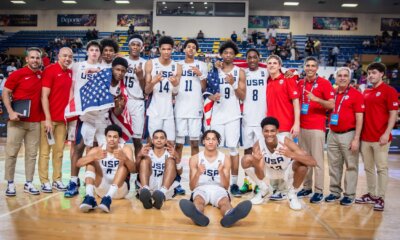
For the most part, getting answers in the recruiting process is not too challenging. A lot of information is self-evident and available with very minimal effort. Coaching staffs are going to get you the information which they deem important but will also be helpful in making sure that you don’t have further questions in the home stretch of the decision derby. At the same time it’s always important to remember that they do have an agenda and are going to “spin” any awkward answers like President Obama or Mitt Romney in an election eve press conference. This doesn’t make them dishonest or misleading; it just means they’re trying to portray their university, program and staff in the most positive light.
From all the ones who have ever hung a championship banner to those who only dream of double digit wins, every program has its high points and each and every one of them have their not so shining characteristics just the same. The recruiters you deal with will be quick to point out the pluses to you time and again…and again still! The good ones will beat you to the punch on their negatives and be up front about it. This could be because they happen to be straight forward and honest or it could be because they want to address the issue in their own manner and put whatever the concern might be to rest. Others will be ready with a scripted and prepared response in the event a less than flattering topic comes up but will leave it to come up on its own rather than wearing it on their sleeves for everyone to see. Then, of course, every once in a while you’ll also come across those who will avoid, hide and deny in every way possible something they feel might be detrimental to their recruiting efforts.
Some topics can be one time issues that need addressed and others may be ongoing trends that can be of concern to a recruit and her parents. Regardless of their scope and frequency, any matter that raises the eyebrows of a prospect and her family warrants addressing by the coaches from that particular program. Getting these answers will also give the athlete insight as to the honesty of a staff as well as their commitment to making you comfortable with every aspect of what they have to offer.
Here are some sometimes tough to answer questions and topics you’ll want to get the answers and insight to as you consider the schools actively recruiting you.
When does the Head Coach’s contract expire? You want to word it just that way since some coaches will claim to have a five year contract but will leave out the minor detail that it expires before you get on campus or after your freshman year. Coaching changes are a reality in today’s recruiting landscape and it’s important to know just what stability a staff might have before you put your future in their hands. Look at the pressure on a struggling coach, the interest of other schools in a successful one and the long term likelihood of that coach being there throughout your entire career.
Is there a buyout in the Head Coach’s contract? While it may seem to be prying beyond what is appropriate, if a coach can freely leave for their alma mater or can catch the first bus to the big time after a winning season, you have the right to know. What salary they happen to make is absolutely none of your business but their options out most certainly are. Leave nothing to chance.
How long have the current assistants been on staff and what has been the turnover during the Head Coach’s tenure at that specific school? No decision should ever be made on the basis of assistant coaches but if there seems to be a revolving door on that end of the bench it could be a red flag worth looking into. If coaches have come and gone with some regularity it’s important to find out where they landed. Their move may have been for professional advancement or it could be that the boss is tough to get along with. Never underestimate the value of continuity in a coaching staff.
How many transfers, dismissals and suspensions have occurred in the past four years? An ever changing roster should set off alarms in the mind and thought process of every recruit looking at a school. Look at their previous rosters and signing classes and get an explanation for every athlete who didn’t complete their career or are no longer on the current roster. If players are leaving following every season or coaches are showing them the door…something is amiss! Every program has lost a player here or there but a steady stream may indicate that the issue doesn’t lie with the players.
What is the graduation rate of the players that the head coach has signed to national letters of intent while at this specific school and throughout his or her career? Beware of the very misleading phrasing “of every player who has completed their four years of eligibility”. I would hope that number is high, if not 100%, with them being in the program at least four years. It’s the ones they signed who did not complete their four seasons that you want to know about. The NCAA provides graduation rates that are as challenging to read as Tolstoy’s War and Peace. The number you ultimately want is the percentage of signees who go from National Letter of Intent to diploma. If a program signed seven in a class and only four graduated, you need to know why.
What are the crime rates on campus and in the local community? Here again you want to watch terminology. If they tell you that there has been only X number of violent crimes in the past 10 years you want to follow up and find out how many occurred in the last two or three. There may have only had a few but if they’ve all been recent, it changes the entire perspective. With crime you have to be realistic. All campuses are going to have some occurrences of criminal behavior, but the number and severity are often relevant to choices made by the entire university community. Also, because it’s likely that you’ll be living off campus it’s critical to know just how busy the local folks with a badge have been. Safety is not only important for your own well-being but for mom and dad’s peace of mind as well.
The following may or may not be important to a prospect, but if it is, there is absolutely nothing wrong with asking.
What is the marital status or sexual orientation of the head coach or staff? In 25 years of coaching few things were as amusing as watching a prospect, or more often her parents, hint about, dance around or just struggle with the topic. The bottom line is that they’re asking to be a de facto surrogate parent of a young adult for four years; they should have no reservations what so ever about being open and honest about the question. That being said, I’m not sure how being gay, straight, married or single makes someone a more or less qualified coach. But if for whatever reason it’s an answer that’s important to an athlete or her family then it should never be addressed by a third party or ever go unanswered. Get it from the horse’s mouth.
Some other topics that are worth exploring that may not be deal breakers but could be issues for some recruits.
A Coach’s Job History – If a coach was fired from previous jobs or has a gap in the timeline, it’s fair to ask what happened and why things are or will be different this time around. If they left and it was a parallel or unusual move, find out why they made that decision and the odds of it happening again.
Religion – Is it a comfortable atmosphere for an individual of any belief or level of conviction? Are there mandatory participation scenarios? Sometimes even if activities are optional it’s awkward to opt out if the staff or the majority of the team is participating. It’s a good question that should be asked of the players as well as the staff. (Answer may and should vary from public to private schools)
Where Are They Now – They’ll willingly tell you about their stars and success stories, but pick some lower profile former players to ask about off the cuff. It will tell you about the path of other athletes as well as provide insight to the relationship the coach keeps with former players.
Off Campus Living – Know the all of the program’s guidelines (when, where, roommates, meals) as well as the exact figures the current off campus resident athletes are receiving as a stipend. Policy varies from school to school and program to program.
Cafeteria or Training Table Hours – Will a hot meal ALWAYS be available regardless of practice or game times? (One school I worked at the players had to pick up a “bag lunch” because of cafeteria hours…Seemed like a middle school flashback!)
Parking on Campus – It’s great to have a car but things could be expensive and inconvenient. Know permit costs and the battle you’ll have to fight for parking spaces near the dorm and athletic facilities.
It’s always said that the only inappropriate question is the one not asked and in the realm of recruiting, no statement could carry more truth. As mentioned earlier, a program’s openness and willingness to answer is just as revealing as the information itself. Any coach offended or doing the political shuffle with their responses is someone to reevaluate and most likely steer clear of. Putting coaches on the spot and asking them the tough questions will provide both insight and comfort in the decision to ultimately choose a school or drop them from your list.
Mark Lewis is a national evaluator and photographer for Blue Star Basketball as well as the lead columnist for Blue Star Media. Twice ranked as one of the top 25 Division I assistant coaches in the game by the Women's Basketball Coaches Association (WBCA), he logged 25 years of college coaching experience at Memphis State, Cincinnati, Arizona State, Western Kentucky and Washington State. Lewis serves as a member of the prestigious McDonald’s All-American selection committee as well as the Naismith College Player and Coach of the Year committees.

Latest Articles
-


Christopher Lawlor
/ 3 days agoNBPA Top 100 Camp moves venue but the top-notch talent, coaching still shines in South Carolina
ROCK HILL, S.C. — The National Basketball Players Association tipped off its annual elite...
-


Christopher Lawlor
/ 6 days agoUSA defeat Canada in FIBA U16 AmeriCup Final to lift the trophy for ninth time with a perfect mark; Nasir Anderson earns Most Valuable Player
CIUDAD JUAREZ, Mexico – The FIBA U16 AmeriCup 2025 throne has the United States’...
-
Christopher Lawlor
/ 1 week agoSPEARHEADED: Americans crush Brazil by 79 points at FIBA U16 AmeriCup quarterfinals; Marcus Spears Jr. puts up 16 points and 9 rebounds
JUAREZ, Mexico — The USA men passed its first test in the knockout stage...
-


Christopher Lawlor
/ 2 weeks agoSTARS SHINE: Bailey, Costello earn Co-MVPs at 23rd Pangos All-American Camp in Las Vegas; three Santa Margarita (CA) players recognized
LAS VEGAS – The Pangos All-American Camp did not disappoint. For three days the...




